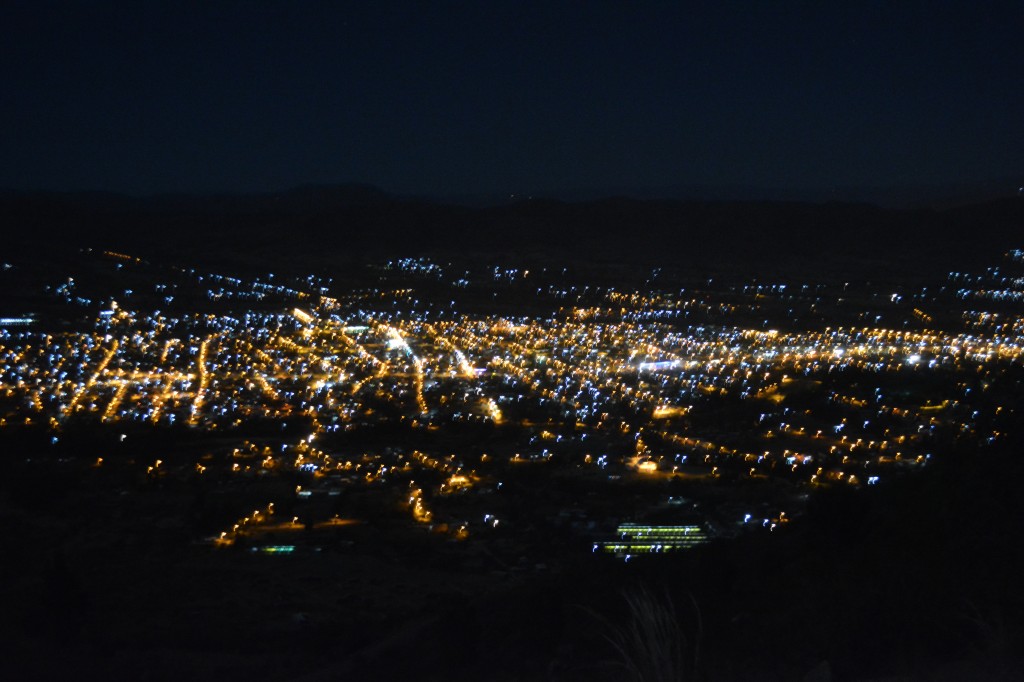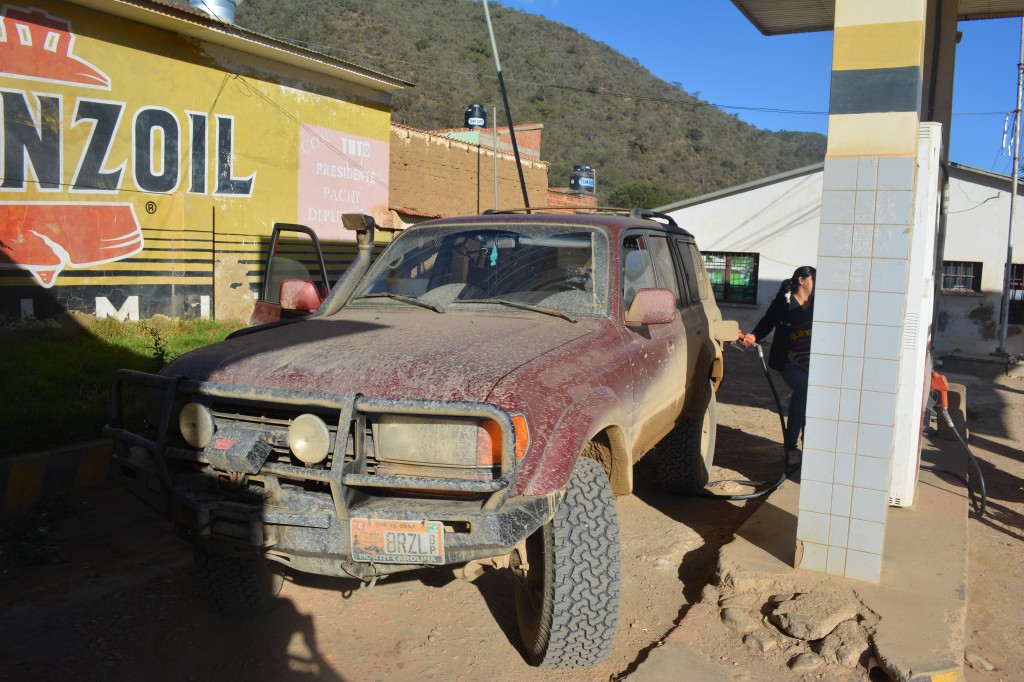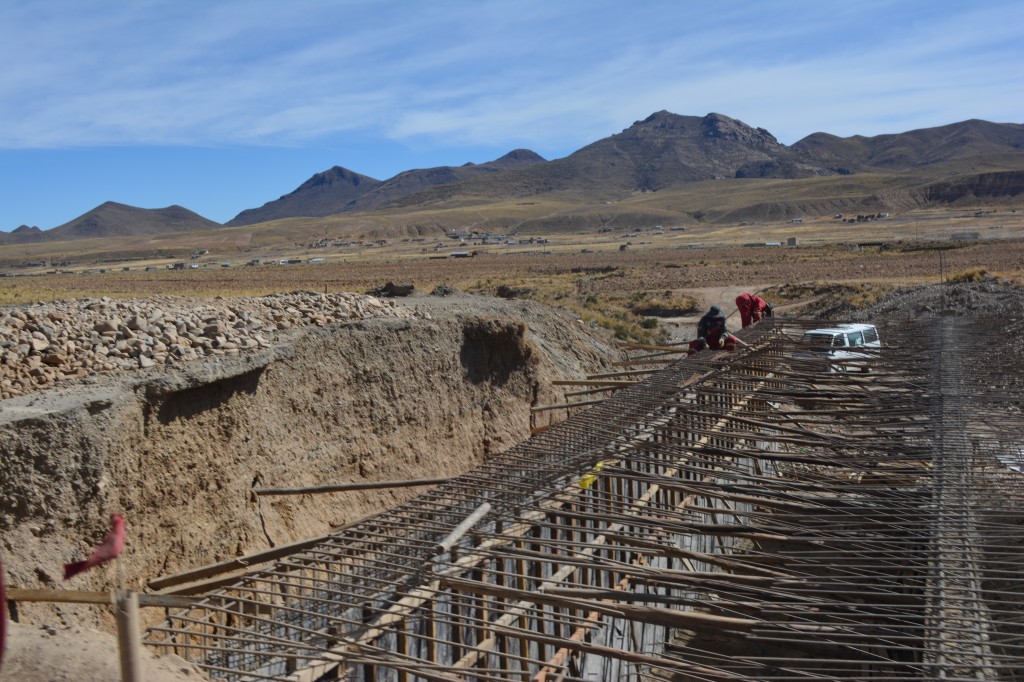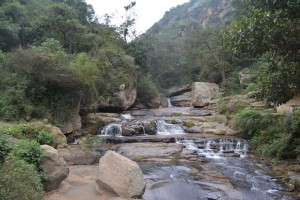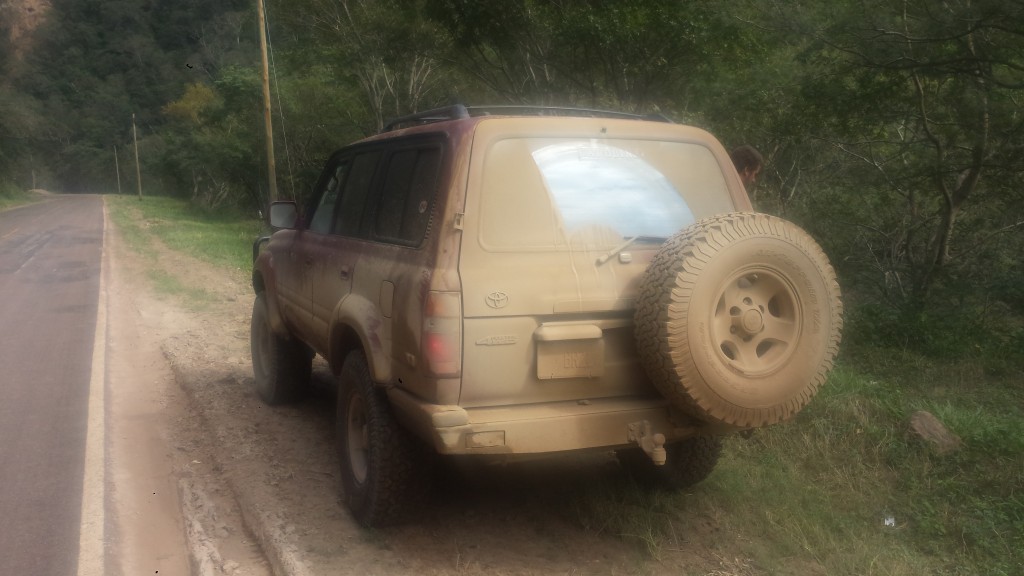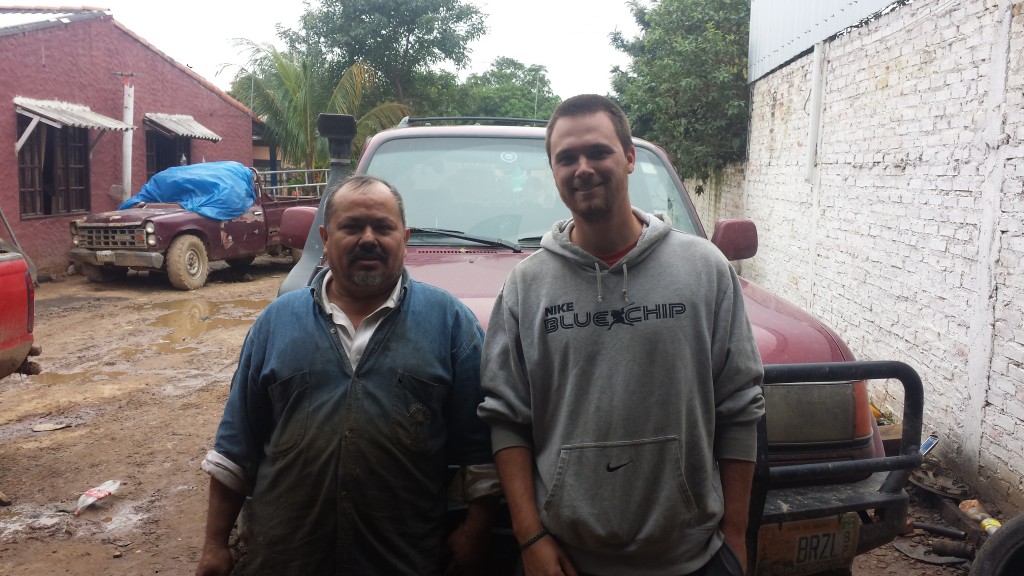We backtracked down from the mountain above Cochabamba while it was still dark and found ourselves winding even further down from the mountains. The constant snaking of the roads and the apparent lack of pavement made for a rather stressful drive as we were trying to make up time from our border delays the day before. Unfortunately, every slight acceleration was followed quickly by a tap of the brakes, and the constant stop-and-go made for pretty slow time. While the roads were awful, the scenery was nothing short of gorgeous. The huge peaks and mountain plains gave way to lush mountain rainforest and jungle, and despite the slow going, glimpses of waterfalls and rivers made the plodding pace more bearable. Sunrise on the cliffs was also a beautiful distraction from the road quality, even if the blinding sun caused a few of its own slammed brakes. We coasted down from the first section of mountain running dangerously low on gas as we entered the first town. Thankfully we found the gas station and barely squeezed into filling lane. Bolivia was not made for large American trucks, apparently.
We did encounter our second example of “foreigner-targeting”, one we would encounter many more times, when we first tried to buy gas in Bolivia. There was a disproportionate amount of attempted police bribery in Bolivia when compared to the other countries in South America. For better or for worse, we had learned to perfect the “dumb gringo” defense. The basics of this are: never admit you did something wrong (you usually didn’t have to pretend), and never admit that you understand Spanish. Confidence is key. One example in particular illustrates this strategy. Outside of La Paz we passed through a toll gate and were promptly waved over. An officer walks up behind the car and jotted down something on his notebook, before informing us that we were going 120 kilometers an hour and had to a pay a serious fine. If you read our last post, you would understand that the road quality outside of La Paz is horrific. In truth, I wish we had been going 120 because we would have at least made decent time on the road, but in reality it was physically impossible to go more than 60 thanks to the widespread construction. The officer claimed his “friend” up the road caught us on radar, and showed us our plate number on his notepad – the same plate number he no doubt scribbled down after pulling us over. Business as usual, we had the option of paying the fine back in La Paz, or we could conveniently slip the officer a few hundred Bolivianos to make it all go away.
Now we knew full an well what the officer was trying to do, and despite his gruff authoritative attitude, we weren’t having any of it. So we smiled. We handed over our documents, and with a feigned quizzical look on our faces, we asked 120? No es posible! He countered with some long explanation of what we had done wrong (somehow more in depth than “you were speeding”) and how much we had to pay. We explained in poor Spanish that the roads were bad and there was no way we were speeding. He returned each time to his friend and his radar, and we knew we had him. Ok, Grant said pointing to his eyes, let us see the radar. He fumbled and tried to return to the money, telling us it was a huge fine in town and we were better off paying it there. Calmly and without ever losing our smiles, we said we indicated that we would happily pay the ticket but only if he showed us the actual radar first. That was the final stroke, and the officer knew he was defeated. He handed us our papers and said we were free to go, he was only going to give us a warning. Right… the only warning we actually got was to watch out for corrupt cops. We had encountered quite a few already, but this was a grim reminder that Bolivia was full of corruption, and we had better be on our guards.
We expected to be targeted by the police, but we were blindsided by how universally accepted it was to target gringos. We pulled up to a pump at a gas station and looked for an attendant to ask about the price, which was not displayed anywhere. The price she told us was very cheap, roughly $1.75 U.S. per gallon. Awesome! It was always nice to find cheap gas when you’re driving 11,000 miles! But then she looked at our license plate… Discovering that it was not from within the country, she informed us that, per the government, the price for foreign nationals was more than double that for locals. We thought she making something up, and refused to agree. She then showed us the computer at the station, and, sure enough, the official price was based on your car’s license plate. She told us, apologetically, that she would get in trouble if she sold gas to us at the local price, as in trouble with the local government! Furious, but needing to fill up very badly, we agreed to buy at the foreigner price and were on our way. To our surprise, this ended up being a nationwide law, and at every gas station from there on out, we paid double the local price to fill up. One station wouldn’t even fill us up at all, and we had to use our spare gas tanks to even buy gas! The first time round it seemed like an opportunistic move to squeeze us tourists for some extra cash, but it was so widespread it was basically institutionalized. You would think most nations want to encourage tourism, but Bolivia seemed perfectly content in exploiting foreigners whenever they could!
We left the gas station irritated but with a new sense of hope. Despite charging extra for gas, the attendant was very nice and after hearing of our travel plans, she told us the road to the Brazilian border was good! We were making a snail’s pace, but at least the roads would be better from here on out! If our first day and half was any indication, if we were going to make it out of Bolivia on time, we would need all the help we could get. Leaving town, the next section of the trip was beautiful. The jungle around us became thicker and greener with every mile and the mountains, although much smaller than before, became more pronounced as their cliffs and edges stuck out among the dense foilage. Waterfalls trickled down in white lines on distant peaks and we made our way past the beautiful backdrops descending further and further in to the countryside. The road slowly began to flatten out and before we knew it the mountains were behind us and the jungle, dense and lush, swallowed up the land around us. It was nice to get away from the switch-back filled roads and get on some straight highway for once, but the mountains had already taken their toll on the Cruiser. The brakes were failing.
They started making a gravely, scraping noise after our first day in Bolivia. The mountain roads and stop-and-go of the construction had done our brakes in. The fact that they had already traveled several thousand miles prior certainly didn’t help, but Bolivia was the straw that broke our camel’s back. We knew they would need some work, but it wasn’t until we tried to stop and couldn’t, nearly having to drive off the road in the process, that we figured we should stop for help. Easier said than done. The first gas station we stopped at, despite several large signs for a mechanic, said that they didn’t fix cars, and that we would have to go back the way we came. We looked at the brakes ourselves, but they were out of our abilities, so we turned on the hazards and hobbled back down the road. We must have stopped at three or four different places before we finally found our guy. Pirata, they each said, You have to find Pirata. The search for this elusive man led us to Pailon, a tiny town with streets filled with mud after the heavy rain from that afternoon. We were directed to a small house with a large backyard filled with cars and car parts, and that’s where we finally met the man himself. Pirata was short, round man with crooked teeth and a screeching laugh. He could fix the car, but he couldn’t do it that night. He told us to come back the following morning. It was getting dark and we had little other choice, so we left the car with our new mechanic and wandered off in search of the only hotel in town. We checked into a small room towards the back and although we weren’t happy to be sidelined, showers and a real bed were a welcome commodity. Clean for the first time in days, we walked to the town center and found a small restaurant to grab dinner and watch Australia vs. Chile, our first game of the World Cup. The food was mediocre, but after our ordeals in Bolivia, we were happy to sit down and finally watch some footy.

